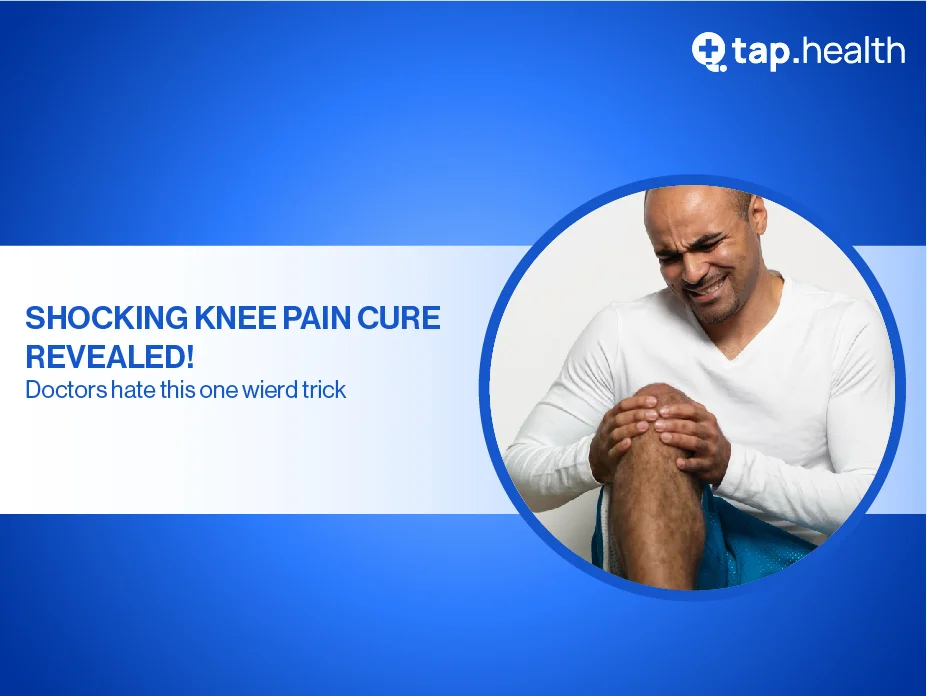Knee pain is a widespread issue that can disrupt daily life, affecting people of all ages. Whether caused by injury, overuse, or conditions like arthritis, managing knee pain at home is possible with the right techniques. This blog explores practical home remedies for knee pain, including the RICE method, heat therapy, gentle exercises, anti-inflammatory foods, natural supplements, and weight management. By understanding these approaches, you can alleviate discomfort and promote knee health naturally.
What Causes Knee Pain?
Knee pain stems from the knee joint’s complex structure, which includes bones, ligaments, tendons, cartilage, and muscles. Common causes include:
- Injuries: Sprains, strains, or meniscus tears.
- Arthritis: Osteoarthritis or rheumatoid arthritis.
- Overuse: Repetitive stress from activities like running.
- Other Conditions: Bursitis, tendinitis, or patellar issues.
Risk factors such as obesity, aging, or improper movement mechanics can worsen knee pain. Understanding the cause is key to choosing the right remedy.
How Does the RICE Method Help with Knee Pain?
The RICE method—Rest, Ice, Compression, and Elevation—is a go-to strategy for managing acute knee pain and swelling.
Rest for Recovery
Resting the knee prevents further strain and supports healing. Avoid high-impact activities and listen to your body’s signals to determine when to resume movement.
Ice for Pain Relief
Applying ice reduces inflammation and numbs pain. Wrap an ice pack in a cloth and apply it for 15-20 minutes every few hours. Avoid direct skin contact to prevent ice burns.
Compression for Support
Using an elastic bandage or sleeve minimizes swelling and stabilizes the knee. Ensure the wrap is snug but not too tight to avoid circulation issues.
Elevation to Reduce Swelling
Elevate your leg above heart level using pillows to promote fluid drainage and reduce swelling. This is especially effective after activity or injury.
Can Heat Therapy Ease Knee Pain?
Heat therapy is effective for chronic knee pain or stiffness, as it improves blood flow and relaxes muscles.
How Heat Therapy Works
Heat dilates blood vessels, delivering oxygen and nutrients to damaged tissues. This promotes healing and reduces muscle spasms.
Applying Heat Safely
Use warm towels, heating pads, or hot packs for 15-20 minutes. Ensure the temperature is comfortable to avoid burns. Warm baths are another soothing option.
Benefits of Heat Therapy
Heat therapy enhances flexibility, reduces stiffness, and aids fluid drainage, making it ideal for arthritis-related knee pain or muscle tightness.
What Exercises Help Relieve Knee Pain?
Gentle exercises and stretches strengthen the muscles supporting the knee, improve mobility, and reduce pain.
Low-Impact Exercises
Activities like walking, swimming, or cycling are gentle on the knees while promoting joint health. These exercises maintain mobility without causing strain.
Safe Stretching Techniques
Incorporate stretches like:
- Hamstring Stretch: Sit with one leg extended and gently reach for your toes.
- Quadriceps Stretch: Stand, pull one foot toward your glutes, and hold for balance.
- Calf Stretch: Push against a wall with one leg extended back.
Perform stretches slowly, avoiding jerky movements, to prevent injury.
Importance of Balance and Rest
Balance exercises, like standing on one leg, improve stability. Rest days are crucial to avoid overuse and allow muscles to recover.
How Can Diet Reduce Knee Inflammation?
A diet rich in anti-inflammatory foods can significantly reduce knee pain and support joint health.
Foods That Fight Inflammation
Incorporate these into your meals:
- Fatty Fish: Salmon or mackerel, rich in omega-3s.
- Berries: Blueberries and strawberries, packed with antioxidants.
- Leafy Greens: Spinach or kale for vitamins and minerals.
- Turmeric and Ginger: Natural anti-inflammatory spices.
- Nuts and Seeds: Walnuts, chia seeds, or flaxseeds for omega-3s.
Beverages for Joint Health
Green tea, loaded with catechins, reduces inflammation. Replace sugary drinks with green tea for added benefits.
Foods to Avoid
Limit processed foods, sugary snacks, and fried items, as they can increase inflammation and worsen knee pain.
Are Natural Supplements Effective for Knee Pain?
Certain supplements and topical remedies can complement other home treatments for knee pain.
Topical Remedies
Creams with arnica, menthol, or capsaicin provide temporary pain relief by soothing the affected area.
Oral Supplements
Consider:
- Turmeric: Contains curcumin, a potent anti-inflammatory.
- Glucosamine: Supports cartilage health.
- Ginger: Reduces inflammation and pain.
Always consult a healthcare professional before starting supplements to ensure safety and proper dosage.
Why Is Weight Management Important for Knee Health?
Excess weight puts undue stress on the knees, worsening pain and increasing injury risk.
Impact of Weight on Knees
Each extra pound adds pressure to the knee joints during movement, accelerating wear and tear. Weight loss can significantly reduce pain and improve function.
Tips for Healthy Weight Loss
- Balanced Diet: Focus on whole foods like vegetables, lean proteins, and healthy fats.
- Regular Exercise: Incorporate low-impact activities to burn calories without stressing the knees.
- Professional Guidance: Work with a dietitian or doctor for a tailored plan.
When Should You See a Doctor for Knee Pain?
While home remedies are effective for mild to moderate knee pain, certain symptoms require medical attention.
Red Flags to Watch For
Seek professional help if you experience:
- Severe or persistent pain.
- Significant swelling or instability.
- Inability to bear weight or walk.
- Symptoms following a sudden injury.
A doctor may recommend imaging, physical therapy, or other treatments to address underlying issues.
Conclusion
Managing knee pain at home is achievable with remedies like the RICE method, heat therapy, gentle exercises, anti-inflammatory foods, supplements, and weight management. These strategies can reduce discomfort, improve mobility, and promote long-term knee health. However, persistent or severe pain warrants professional evaluation to ensure proper care. By adopting a holistic approach, you can take control of your knee health and enhance your quality of life.



